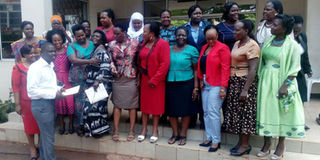Life after Parliament

Members of Visionary Women group at the launch of the Sacco in Kampala recently. PHOTO BY AMOS NGWOMOYA.
What you need to know:
After failing to be re-elected to Parliament, 50 women have come together to form a Sacco through which they plan to play a leading role to change the lives of women as well as changing the attitude that politics is the end to everything.
Being an MP is a rewarding experience that comes with lots of trappings.
It is an experience that few would voluntarily quit in a country where unemployment and business failure has become a routine.
Many actually forget it is just a social contract that has to be renewed every after five years, according to the Constitution of Uganda.
But again you wonder how these people who enjoy a near life of luxuries find themselves trapped in deep debt and with no clue of surviving through.
Such challenges made a group of about 50 former women MPs to form a Sacco, Visionary Women, through which they empower women as well as improve their lives.
The Sacco, which doesn’t discriminate in political lineage, was started in May and currently has a group savings portfolio of more than Shs900m.
Membership is based on an initial Shs10m contribution and non-fixed monthly savings.
Rosemary Nyakikongoro is a former Woman MP for Sheema District and is one of the founding members.
The idea, she says, is one way through which members engage in development projects instead of soaking themselves in misery after losing elections.
“We can’t become beggars yet we have the brains and the will to empower ourselves. Politics is a service and not a job. You cannot rely on it as your source of livelihood,” she says, noting that many politicians have ended up becoming “irrelevant because they only think of politics as the end of the world”.
Lives to live
Nyakikongoro says they have lives to live after politics and they are currently piloting studies in different districts to ascertain how “our programme could be implemented among the village groups”.
The group is mainly focused on working with underprivileged women with the view of entrenching itself activities in the lowest of societies in both villages and urban areas.
Sarah Mwebaza Wenene, the former Kibuku Woman MP and a member of the Sacco, says politicians have to live with many challenges, which might to the extreme include assisting people’s financial expectations.
The challenges, she says, are enormous and they have in most cases proved burdensome and draining to politicians.
“We are looking at value addition. If we empower women, they will be able to supplement their incomes. Definitely, we shall ultimately be fighting poverty,” she says
The empowerment will be achieved through training stakeholders in agribusiness, vocational skills such as tailoring and weaving as well as managing finances. Groups that will have proven capacity will be facilitated with capital injections to be paid over a period of time.
However, Wenene says much of their plans will be achieved through support from key stakeholders including government and civil and non-governmental organisations.
Members have already made pilot studies in northern, eastern and central Uganda to see how the programme can successfully be rolled out.
In 2015, the African Union recognised Uganda for its ‘progressive policy on the promotion of gender, equality and empowering women.’
AU through the African Gender Scorecard Awards recognises member states that exhibit good progress, especially in women empowerment.
Sharing success
This perhaps could be the benchmark on which the Visionary Women Sacco is drawing its experience and strength to share the success that has been achieved elsewhere.
The AU Scorecard was first introduced at the 25th Heads of State and Government Meeting in South Africa under the theme “Women’s Empowerment for the Realisation of Agenda 2063”
Victoria Rusoke, the former Kabarole District MP believes that women should be taught to generate income from un crowded areas such as agriculture and small scale businesses.
This, she says shall be achieved through good leadership and redirecting priorities, especially those that have a direct impact on the grass roots and women groups.
“There are people who have a tendency of people ridiculing political losers but we want to disapprove them. Many people are suffering because they are ignorant of some programmes but by bringing women on board through business enterprises, we will be building the nation,” she says.
Future plans
Sacco members believe they have the capacity to become a global women empowerment organisation that emphasises women empowerment in terms of financing.
According to former Minister of Microfinance, Caroline Okao, the Sacco plans to form an organisation that will bring together women activities through which they can be supported.
“We have Shs900m now and we are still saving. This money will help us achieve our target of transforming lives of mothers,” she says.
Redeeming Ugandans out of poverty, Okao says, will be incumbent upon “every Ugandan and because women are the majority, it would be like betraying ourselves if they are not empowered”.
MEMBERS
- R. Nyakikongoro
- Christine Achayo
- Sarah M. Wenene
- Evelyn K. Mpagi
- Caroline A. Okao
- Akol Rose Okullu
- F. Mutyabule
- Victoria Rusoke
- Dorothy Mpiima
- Kabakumba Matsiko
- Sarah Lanyero
- R. Najjemba
- Florence Ibbi
- Rukia Nakadama
- Rhona Ninsiima
- Sarah Kataike
- Margaret Iriama
- N. Kabasharira
- Rebecca Otengo
- Mariam Nalubega
- Grace Namara
- Adiru f. Nebanda
- Flavia Kabahenda
- L. Timbigamba
- Rose Iriama
- Rose Akello Lilly
- Juliana M. Auma
- Olivia K. Kwagala
- Sylvia Sinabulya
- Barumba Rusaniya
- S. K. Netalisire
- T. Sentongo
- Betty Mbabazi
- Jennifer Mujjungu
- Phyllis Chemutai
- Chellengat Tete
- Grace Byarugaba
- Anne Auru
- Oleru Huda
- Florence Kintu
- Emma Boona
- Agnes Nabirye
- Mary Judith Amoit
- Flavia Munaaba
- Christine Aporu
- Margaret Makhokha
- Fridah K. Mubanda
- Ruth O. Lematia
S. M. Nyirabashitsi




